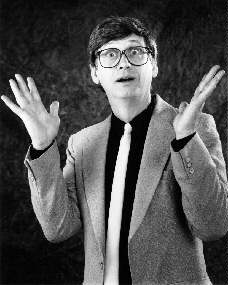New literary journal includes works by Boe
July 20, 1997
Elisabeth Sherwin -- gizmo@
dcn.davis.ca.us
A new literary journal published in New York this summer, Oxymoron, includes two essays by Northern California writer John Boe for its single-theme debut issue on "chance."
"The goal of Oxymoron was to present an accessible cross-section of profound ideas on a single theme to a lay public," said publisher Trish Hagood.
"We tried to cover as many disciplines as possible," she added. "All literary and art forms are accepted -- photography, fiction, poetry, cartoons, essays, art, graphics. The intention with the graphics was to break all the rules but still keep the text fairly legible. I did not want to see a boring page, and I don't think we have one. We wanted an inter-relationship between the text and the graphics that would pull a reader in -- a mix of puzzle and scavenger hunt. This is not a work to read quickly but to pick up and enjoy a little at a time. There are many subtleties."
Hagood learned of Boe from his sister, an Oxymoron consulting editor, Meg Boe Birns, who teaches at New York University and The New School.
"(Meg) was a huge help on this project, not the least of which was recommending her brother, who has a special interest in chance and gambling as you can see by his two articles. I was not sure I wanted to include reprints, but his gambling piece was too good to pass up ("Papa was a Gamblin' Man"). We also got a reprint from Stephen Jay Gould who offered us any of his work gratis. The truly great people are generous. Same for Richard Foreman, the playwright, and Duane Michals, the photographer."
The theme for the next edition of Oxymoron is "the fringe." Writers and artists are invited to contact Hapgood about submissions at 150 Fifth Ave., Suite 302, NY, NY 10011.
John Boe, who lives in Berkeley and teaches English at UC Davis, will likely write for the next issue of Oxymoron, too. Boe is a teacher, writer, storyteller, poet and essayist. His first collection of essays, "Life Itself: Messiness Is Next to Goddessness," was published in 1994 (the essay on his father is in this collection) but he has published extensively in a variety of publications from the Utne Reader to Psychological Perspectives.
And while one of his essays in Oxymoron is this wonderful, humorous tribute to his father and his family's inclination toward gambling, the other is an equally entertaining but more scholarly look at "The Gambler's God" - systems vs. intuition, science, math, chance, gambling in Dostoevsky's work and a musical transcription of the first 41 digits of Pi.
"The Gambler's God" demonstrates Boe's wide-ranging interests in science and art. He is interested in everything: sex, food, laughter, poetry, music, theater, math, reading and writing.
"I think it's a good thing for a writer to write poetry because it makes you pay attention to the sounds of words, if you understand that poetry is the sound of words. If you write business letters, write poetry, too. It gives you a focus on language," Boe said in a recent interview.
While Boe is primarily a teacher, he tries to find enough time to write, too.
"If I get a little piece of time I'm going to try to do my own writing," Boe said. "I tend not to read a lot of fiction because non-fiction is going to give me material to write about....and I'm interested in education. Math and music are good paradigms for teaching writing, which is much more messy. Music and math are much neater in a way and if I can figure out how to teach them maybe I can figure out how to teach writing."
Boe isn't disturbed by the fact that popular writing today isn't the best writing.
"I like a certain amount of schlock. I think it's always been that way. Look at the 1920s and '30s. The bestseller list wasn't full of Fitzgeralds and Hemingways. The best book aren't necessarily the best sellers. Reading is hard. I sympathize with people who aren't good at reading.
"I don't read many novels these days. The last novel I read was 'Independence Day' by Richard Ford, which I adored. But I spent most of my life as a Ph.D. in English reading fiction and I read a whole lot of it and now insofar as I get time I'm going to read non-fiction and try to do my own writing."
In Oxymoron, a good writer and a good publication have met. Look for issues of Oxymoron at newsstands or bookstores but don't be surprised at the price, which is $50. You're paying for quality.
 John Boe is the author of the essay collection,
John Boe is the author of the essay collection,
"Life Itself: Messiness Is Next to Goddessness,"
and "The Gambler's God" and
"Papa was a Gamblin' Man"
in the literary journal, Oxymoron (issue 1, 1979).
Elisabeth Sherwin interviews John Boe in
"New literary journal includes works by Boe,"
the July 20, 1997 Printed Matter column.
Photo -- Courtesy
|
[Author Menu] [Date Menu] [Genre Menu] [Printed Matter Home]
The Davis Virtual Market
 John Boe is the author of the essay collection,
John Boe is the author of the essay collection,